Shopify is a top choice for entrepreneurs who want to build and grow their online businesses. While starting a store from scratch can be rewarding, buying an already established Shopify store can save you time and effort and get you into the eCommerce game faster.
But why buy an old Shopify store? What are the potential challenges, and where can you find these stores?
In this guide, we’ll explain everything you need to know about purchasing an entire Shopify store. From understanding the benefits to finding the right marketplace, this information will help you make a confident decision about your eCommerce journey.
Why Consider Buying A Shopify Store?
Before diving into the process of acquiring a Shopify store, it’s essential to understand the advantages of this approach compared to building a store from the ground up.
1. Established Infrastructure
One of the most significant benefits of buying an existing Shopify store is the ready-made infrastructure that comes with it. This includes:
- A fully functional website
- Existing payment gateways
- Inventory management systems
- Established supplier relationships
By acquiring a store with these elements already in place, you can save considerable time and financial resources that would otherwise be spent on initial setup and configuration.
2. Immediate Revenue Generation
Unlike starting from scratch, where it may take months or even years to turn a profit, a well-established Shopify store can provide immediate revenue. This means you can start earning from day one, allowing you to focus on growth strategies rather than worrying about initial cash flow.
3. Proven Business Model
Purchasing a Shopify store with a track record of success minimizes the inherent risks of business ownership. You’ll have access to historical sales data, customer information, and proven marketing strategies, allowing you to make informed decisions about future growth.
4. Brand Recognition
Building a brand from the ground up requires significant time, effort, and marketing budget. When you buy an existing Shopify store, you acquire a brand that’s already recognized and respected by its target audience. This brand recognition can give you a competitive edge and help you establish trust with potential customers more quickly.
5. Growth Opportunities
An established Shopify store often comes with untapped potential for growth. Whether it’s expanding into new markets, optimizing the product lineup, or improving marketing strategies, you’ll have a solid foundation to build upon and take the business to new heights.
Types Of Shopify Stores Available For Purchase in 2025
When looking for Shopify stores for sale, you’ll encounter quite a few types of Shopify store based business. Understanding these different types can help you choose the one that best aligns with your goals and expertise.
Dropshipping Businesses
Dropshipping stores partner with suppliers who handle inventory storage and order fulfillment. As the store owner, you’re responsible for marketing and customer service. This model is popular due to its low upfront costs and minimal risk.
Print-on-Demand Businesses
Print-on-demand (POD) stores offer custom-designed merchandise that is printed when an order is placed. This model is ideal for creative individuals and artists, as it allows for unique designs without the need for upfront inventory costs.
Retail Businesses
Traditional retail Shopify stores sell products directly to consumers. These businesses may focus on selling their own branded products or curating a selection of third-party offerings. This model typically requires more hands-on inventory management and fulfillment.
Wholesale Businesses
Wholesale Shopify stores sell products in bulk to other businesses rather than directly to consumers. This model often involves managing larger inventories and developing relationships with business clients.
Top Marketplaces to Buy Shopify Stores
When looking to purchase a Shopify store, you have numerous options available. Each marketplace has its own unique features and focus, so it’s worth exploring multiple platforms to find the best fit for your needs. Here’s an expanded list of popular marketplaces and platforms where you can find Shopify stores for sale:
1. Empire Flippers
Empire Flippers is a well-respected marketplace known for its rigorous vetting process and high-quality listings. They offer a wide range of online businesses, including Shopify stores, with detailed financial and operational information for each listing.
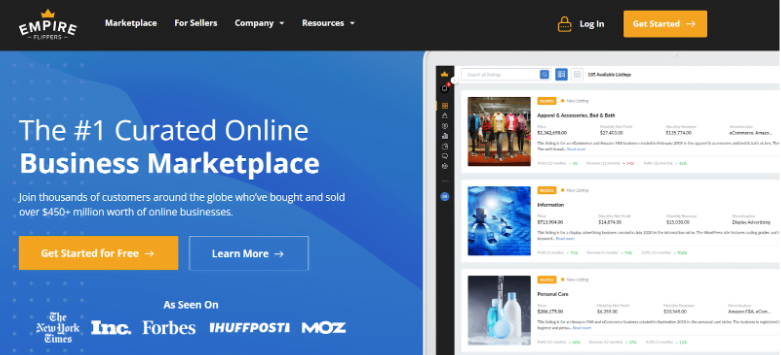
Key features include:
- Thorough vetting of all listings
- Detailed performance metrics and financials
- Support throughout the buying process
- Access to a network of industry professionals
2. Flippa
Flippa is one of the largest and most popular marketplaces for buying and selling online businesses. They offer a diverse selection of Shopify stores across various niches and price ranges.
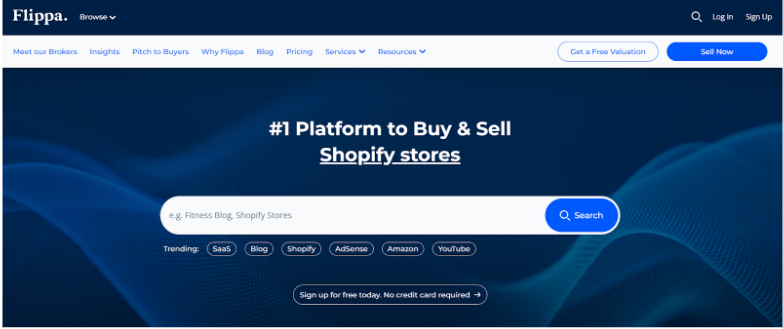
Benefits of using Flippa include:
- Wide range of listings, from small starter stores to established businesses
- User-friendly interface with robust search filters
- Integrated due diligence tools
- Secure escrow services for transactions
3. FE International
FE International is a specialized mergers and acquisitions advisory firm focusing on mid-market online businesses. They offer a curated selection of high-value Shopify stores and provide comprehensive support throughout the acquisition process.

Key features include:
- High-quality, vetted listings
- Comprehensive valuation and due diligence services
- Full support from experienced M&A advisors
- Access to a global network of qualified buyers and sellers
4. Website Closers
Website Closers is a brokerage firm specializing in the sale of eCommerce businesses, including Shopify stores. They offer detailed listing descriptions and expert guidance throughout the buying process.
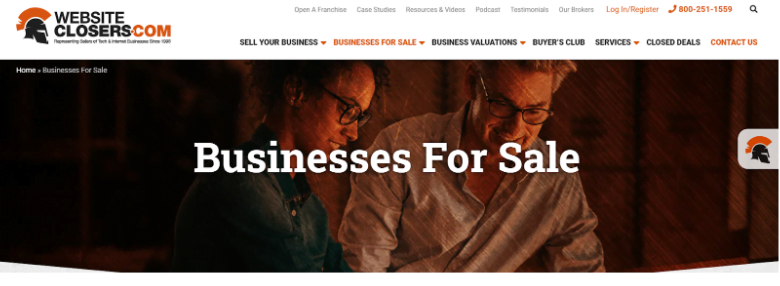
Benefits include:
- Personalized service from experienced brokers
- Thorough vetting of all listings
- Assistance with negotiations and due diligence
- Post-sale transition support
5. Acquire.com
Formerly known as MicroAcquire, Acquire.com is a platform that connects buyers and sellers of online businesses, including Shopify stores. They focus on providing a streamlined, transparent process for both parties.
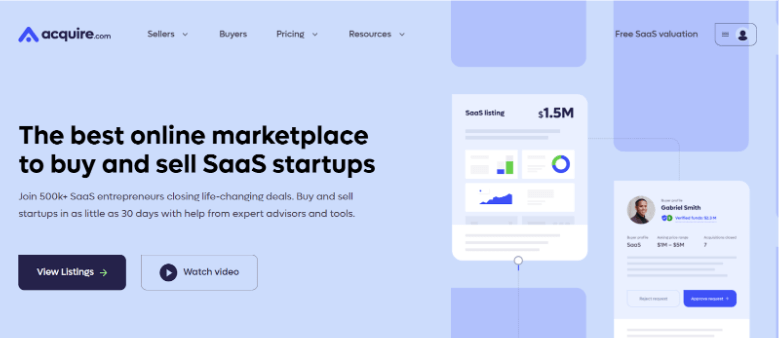
Key features include:
- No broker fees for buyers
- Direct communication with sellers
- Verified revenue and traffic data
- Wide range of listings, including many early-stage startups
6. BizBuySell
BizBuySell is a large marketplace for buying and selling businesses of all types, including online and brick-and-mortar operations. While not specialized in Shopify stores, they do have a section dedicated to eCommerce businesses.
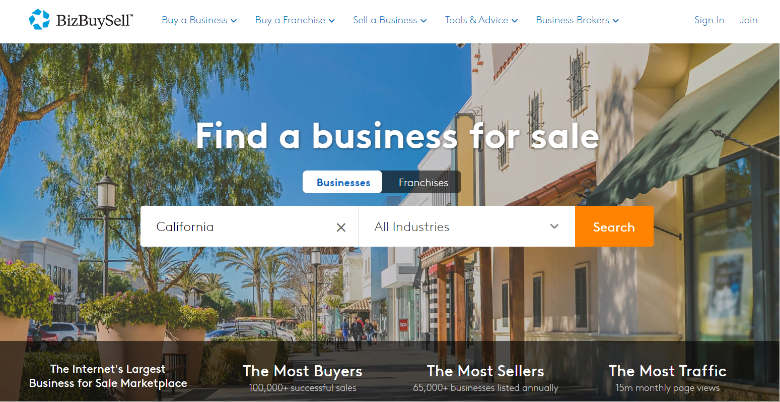
Advantages include:
- Large volume of listings
- Ability to search by location, including international options
- Detailed financial information for most listings
- Access to business brokers and other professional services
7. Quiet Light Brokerage
Quiet Light Brokerage specializes in selling internet-based businesses, including Shopify stores. They pride themselves on their experienced team of advisors who have personally built and sold their own online businesses.

Key features include:
- High-quality, vetted listings
- Comprehensive financial analysis and valuation
- Experienced advisors with firsthand knowledge of online business operations
- Support throughout the entire acquisition process
8. Latona’s
Latona’s is a boutique mergers and acquisitions broker focusing on online businesses, including Shopify stores. Expect curated listings, comprehensive due diligence assistance, and confidential acquisition processes.
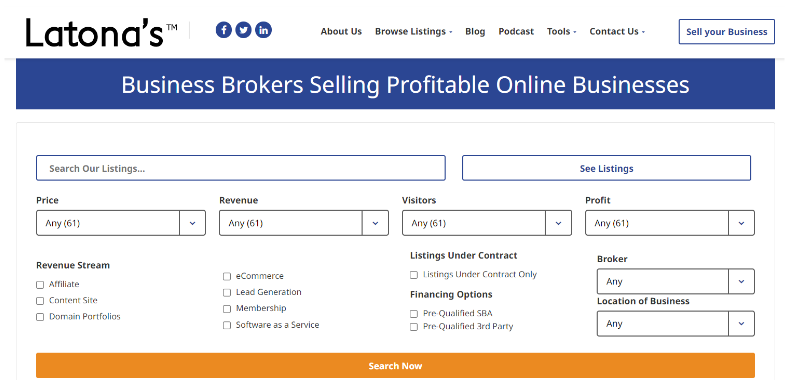
Benefits include:
- Curated listings of established, profitable businesses
- Comprehensive due diligence assistance
- Experienced transaction advisors
- Confidential and secure acquisition process
Difference Between Buying a Shopify Store vs Building a Shopify Store
Deciding between purchasing an existing store or starting from scratch? Here’s a quick breakdown of what to expect:
| Factor | Buying an Existing Shopify Store | Building from Scratch |
|---|---|---|
| Time to Launch | Instant (store is already operational). | 3–6+ months (design, product sourcing, setup). |
| Upfront Costs | Higher upfront price (based on profit multiples). | Lower initial costs (subscription, apps, samples). |
| Revenue Timeline | Immediate cash flow (if profitable). | Delayed revenue (6–12+ months to scale). |
| Risk Level | Lower risk (proven traffic, sales, and reviews). | High risk (no guarantee of product-market fit). |
| Customization | Limited to existing branding/products (may need tweaks). | Full creative control (build your vision). |
| SEO/Traffic | Existing traffic, domain authority, and backlinks. | Start from zero (SEO takes time to grow). |
| Supplier Relationships | Pre-negotiated suppliers (saves time). | Time-consuming to vet and negotiate suppliers. |
| Brand Equity | Established brand (but may require rebranding). | Build a brand from scratch. |
| Scalability | Easier to scale (existing infrastructure). | Requires testing and iteration to scale. |
| Effort Required | Focus on optimization/growth (less groundwork). | Heavy lifting (product research, marketing, etc.). |
The Process Of Buying A Shopify Store
Acquiring a Shopify store involves several crucial steps to ensure a successful and profitable purchase.
Step 1: Determine Your Budget And Goals
Before you start browsing listings, it’s essential to establish a clear budget that aligns with your financial capabilities and risk tolerance. Consider factors such as:
- Available Capital
- Financing options
- Desired return on investment (ROI)
Additionally, define your goals for the acquisition. Are you looking for a hands-off investment or a business you can actively grow and manage?
Step 2: Research And Due Diligence
Once you’ve identified a potential Shopify store for purchase, it’s time to conduct thorough due diligence. This process should include:
- Analyzing financial statements and sales data
- Reviewing traffic sources and SEO performance
- Evaluating the store’s product lineup and supplier relationships
- Assessing customer reviews and brand reputation
- Examining the store’s technical infrastructure and any custom applications
Don’t hesitate to ask the seller for additional information or clarification on any aspects of the business.
Step 3: Valuation And Negotiation
Understanding how to value a Shopify store is crucial for negotiating a fair price. Common valuation methods include:
- Multiple of discretionary earnings (MDE)
- Multiple of revenue
- Asset-based valuation
Consider engaging a professional business appraiser or broker to help determine a fair market value for the store.
Step 4: Legal Considerations And Transfer Of Ownership
Once you’ve agreed on a price, it’s time to formalize the deal. This typically involves:
- Drafting and reviewing a purchase agreement
- Conducting any necessary legal and financial due diligence
- Arranging secure payment through an escrow service
- Transferring ownership of the Shopify store and associated assets
Consider working with a lawyer experienced in eCommerce acquisitions to ensure all legal aspects are properly addressed.
Step 5: Transition And Handover
After the sale is complete, work with the seller to ensure a smooth transition of the business. This may include:
- Transferring supplier relationships and contracts
- Gaining access to all necessary accounts and tools
- Receiving training on store operations and management
- Developing a plan for customer communication regarding the ownership change
Note: A key metric to consider is to consider is the yearly multiple, which is a common valuation metric used to determine the asking price of an e-commerce business.
Customizing Your Newly Acquired Shopify Store
Once you’ve successfully acquired a Shopify store, it’s time to make it truly yours and align it with your vision for the business.
Recheck the Entire Buyer Journey
Start by analyzing and optimizing the entire customer journey from the perspective of both a buyer and a business owner. This will help you identify any areas for improvement in the user experience or operational processes.
Personalize The Design And Branding
Unless you’re planning to maintain the existing brand, take time to customize the store’s design to match your brand message. This may include:
- Updating the logo and branding elements
- Customizing the theme
- Adding new graphics and photos
Integrate Essential Features And Tools
Review the store’s current tech stack and make any necessary updates or additions. Consider integrating tools for:
- Customer relationship management (CRM)
- Email marketing
- Inventory management
- Analytics and Reporting
Prepare For Hidden Fees And Tasks
Be aware that the purchase price of the Shopify store may not cover all ongoing expenses. Budget for potential costs such as:
- Shopify subscription fees
- App and plugin subscriptions
- Regular maintenance and updates
- Marketing and advertising expenses
Tips For Success When Buying A Shopify Store
To ensure a successful acquisition and future growth of your Shopify store, keep these tips in mind:
- Understand the Business Model
Make sure you have a clear understanding of how the store operates, including its supply chain, fulfillment processes, and customer acquisition strategies.
- Look for Value-Add Opportunities
Seek out stores where you can leverage your expertise or resources to add significant value and drive growth.
- Conduct Thorough Market Research
Understand the size of the market, competitors, and potential for future growth in the store’s niche.
- Seek Professional Advice
Don’t hesitate to consult with lawyers, accountants, or experienced eCommerce professionals throughout the acquisition process.
- Plan for the Future
Develop a clear strategy for how you’ll grow and improve the business post-acquisition.
Related Reads:
Conclusion: Empire Flippers Is The #1 Platform For Buying Shopify Stores
Buying a Shopify store instead of starting from scratch can be a great way to start or grow your business. With an established store, you gain access to existing customers, revenue, and a tested business model, giving you a head start.
To make the most of your investment, take the time to research available stores, evaluate listings carefully, and ensure the store aligns with your goals. A structured approach and proper due diligence are essential for success.
By planning wisely and choosing a trusted platform like Empire Flippers, you’re on the right path to owning a Shopify store that can help you achieve your eCommerce dreams.

